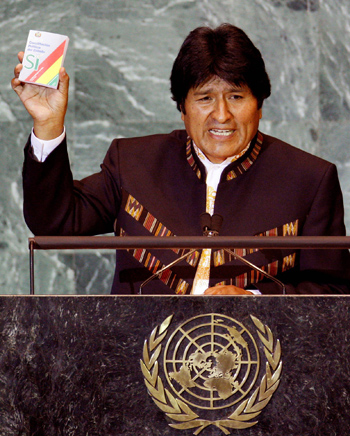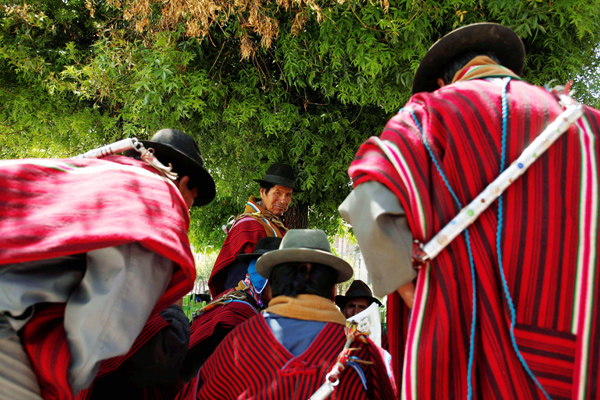
(above) Soldiers patrol the town of Filadelfia last month in Pando, one of four energy-rich, autonomy-seeking provinces in Bolivia. (photo: Associated Press)
Venezuela, Russia aid fight
October 7, 2008 Washington Times
by Martin Arostegui
SANTA CRUZ, Bolivia --- The government of President Evo Morales is lining up military support from Russia and boosting ties with Venezuela as it battles a rebellion in its energy-rich eastern provinces.
 (right) Bolivian President Evo Morales holds a copy of his proposed constitution while speaking at the 63rd annual United Nations General Assembly (Photo: Bloomberg News )
(right) Bolivian President Evo Morales holds a copy of his proposed constitution while speaking at the 63rd annual United Nations General Assembly (Photo: Bloomberg News )
The revolt reflects opposition to Mr. Morales' plans to redistribute land and revenue from natural gas exports to Bolivia's Indian majority under a new constitution that would also allow Mr. Morales to be re-elected for 10 more years.
Government opponents - based mainly in the eastern lowland provinces - say Venezuelan soldiers fought alongside government supporters in Pando province, where at least a dozen people were killed during a Sept. 11 gunbattle.
Pando Gov. Leopoldo Fernandez and at least 16 local officials have been arrested, and residents of Pando accuse government troops of a crackdown that includes summary arrests and severe beatings.
Vice President Alvaro Garcia Linera defended the government action in Pando.
"We are dealing terrorist crimes against the state," he said in response to reports of government brutality.
What at first glance seems like a local insurrection in a landlocked South American country has implications for the United States in its growing rivalry with Russia.
Russian Ambassador to Bolivia Leonid Golubev told the Associated Press that the Bolivia's planned purchase of five military helicopters reflects growing ties with Moscow.
"We want to show the United States that Latin America is not their backyard," Mr. Golubev said in an interview. "We also have interests in various spheres, including military ones."
Russia's navy plans to hold military exercises with Venezuela in the Caribbean. That plus a growth of Russian arms sales, especially to Venezuela, regularly draws protests from Washington.
Secretary of State Condoleezza Rice said in a recent interview that the Russian buildup in Venezuela doesn't threaten the United States.
"America has plenty of military power in the Western Hemisphere," Miss Rice told Bloomberg News.
(below) Indigenous Aymara leaders gather outside the La Paz prison where Gov. Leopoldo Fernandez of the restless Pando province is being held. Mr. Fernandez is accused of contributing to the deaths of at least 16 Indian fighters. (Photo: Associated Press) 
Miss Rice also dismissed suggestions as "a little bit of myth" that the United States is losing influence in the region.
"Whether it's Central America or Colombia or Chile or Brazil or Uruguay, we have excellent relations and the best relations we've ever had with Mexico. So we're in good shape in the hemisphere."
Mr. Fernandez and other local officials remain confined in military prisons even as Mr. Morales negotiates with governors of three other rebellious and autonomy-seeking provinces - Santa Cruz, Beni and Tarija.
Mario Cronenbold, a congressional deputy from Santa Cruz, says that six Venezuelan soldiers were identified among a dozen bodies recovered from the town of Porvenir in Pando province.
"We have been informed by airport authorities that six coffins were loaded onto a military Hercules transport plane headed for Venezuela last Monday," the lawmaker said.
The Venezuelan newspaper, Noticias 2001, reported that five Venezuelan bodies were flown from Bolivia to the Libertador air base outside Venezuela's capital, Caracas, on Sept. 22.
According to the report, they were members of the Francisco de Miranda Front, an international brigade recently formed by Venezuelan President Hugo Chavez, an ally of Bolivia's Mr. Morales.
The Venezuelan government has made no official comment about the reports.
But Mr. Linera denies that any Venezuelans were involved in the fighting, calling the allegations "lies, inventions and smoke screens to cover up the terrible slaughter of 17 peasants."
The Morales government says a local paramilitary militia opened fire on a largely unarmed crowd of Indian demonstrators.
Mr. Morales won a national referendum on his presidential mandate in August with a 67 percent vote. But governors in the four rebellious provinces also won overwhelming support from their constituents.
Regional heavyweights including Brazil and Chile have backed Mr. Morales in his dispute with the east but urged him to negotiate a peaceful resolution of the conflict.
Edmundo Novillo, who is speaker of parliament's lower house, has confirmed reports that appeared last week in Venezuela's newspaper Universal, that Venezuela has spent $6.7 billion to support Mr. Morales' government.
"It concerns investments of solidarity, which make it possible to improve the economic situation. Venezuela is going through a great economic moment and is the one which has the most to invest to empower the productive apparatus with results for the future," Mr. Novillo said.
Oil-rich Venezuela and Bolivia, the poorest country in South America, signed a military cooperation agreement in 2007 that would authorize Venezuelan officers to direct training missions in Bolivia.
Both are run by popularly elected leftist presidents, who have vowed to remake their nations with socialist-style economies by nationalizing resources such as oil and natural gas. Opponents say those nations are following a Cuban model in which both presidents plan to rule for life or, like Fidel Castro, became too sick to govern.
Brazil reinforced its frontier last week with 600 elite troops and combat helicopters after Bolivian officials asked for the forcible repatriation of more than 1,000 people who have fled across the border, claiming political persecution.
Brazilian officials have denied Bolivian requests for rights to pursue fugitives, and last week, Brazil expelled two Bolivian officials who were accused of spying on the refugees in the border town of Brasilea.
Chilean President Michele Bachelet has offered to send military teams to Bolivia to train troops for humanitarian and peacekeeping operations.